Is the media helping or hurting mental health?
May 22, 2023
In recent years, the impact of media on mental health has become a major concern for many parents and people with access to the digital world. With the rise of social media in the early 2000s and Hollywood’s continuous perpetuation of the “perfect life,” many experts believe this constant barrage of stereotypes can be detrimental to mental health. However, experts claim that there are steps being taken by groups and organizations to fix these issues associated with mental health.
One of the primary ways in which media affects mental health is through the images and messages it presents. Many social media outlets promote unrealistic and unattainable standards of beauty, success and happiness, through pictures and videos, leading to feelings of inadequacy and low self-esteem among viewers.
Dr. Michael A Freeman, a psychiatrist in Marin County who has been practicing since 2000, claimed social media has a lot of positives; however, it is not helping anybody’s mental health.
“Using social media is like driving a car without breaks, turn indicators, rear-view mirrors, seat belts, airbags and crumple zones. Cars used to be unsafe at any speed, but now they are safe due to regulations requiring safety equipment,” Freeman said. “This is not true for social media. Today, social media is unsafe at any speed and it needs a lot of safety improvements before children, adolescents, young adults and anyone else can use it without being harmed.”

In its many forms, social media can also be a source of stress and anxiety. The pressure to present a perfect image online, fear of missing out and the constant comparison to others can contribute to feelings of depression and anxiety.
Dr. Zachary Torry, who has practiced adult psychiatry for 12 years in San Francisco and Mill Valley, says that these common feelings happen through comparison.
“The inevitable comparison that occurs when one views the manipulated highlights of another’s activities leads to feelings of inadequacy, dissatisfaction with one’s own life and envy. Hence, we get the extremely adverse psychological impact of social media,” Torry said. “There have been numerous studies demonstrating the association of depression and anxiety with social media.”
While social media does have benefits, they are not always aligned with people’s well-being and mental health.
Stigmas surrounding mental health have always been present in society. Whether it is a good idea to seek help or individually fix one’s issues has always been a debated topic. Junior Jonathan Evers has taken note of the surrounding problems with mental health and noted the discrepancies around getting help in high school.
“I have noticed that the resources needed to help people with mental health issues are there, but they often go unused due to the stigmas surrounding getting mental health support,” Evers said.
This aligned similarly to the adult perspective Torry has identified in his practice.
“The idea of going to a psychiatrist or psychologist is a deterrent for many, but unfortunately, even a small amount of shame can be the difference between life and death,” Torry said. “In America, one in five adults experience a mental health issue. Also, suicide is one of the leading causes of death in teenagers. Therefore, the need is great, and we in the mental health field strive for a time when the stigma to seek mental health treatment no longer exists.”
These stigmas still exist as they date back to the middle ages, when religious leaders considered mental health symptoms to be a sign of personal failings. Torry expressed that these stigmas are still present, as people feel defeated due to the fact that they have emotional experiences.
“In my practice, many people come into my office feeling ashamed or demoralized that they could not [fix] their emotional struggles on their own, or believe that their problems are insignificant. I spend lots of time trying to dispel those ideas while creating a space of comfort and openness,” Torry said.
While working to get rid of the stigma that has been present for centuries before, it can be difficult to get rid of it completely, but Hollywood’s portrayal of mental health as a common topic is on the rise. Torry considers the coverage of mental health to be improving, but there is always more to be done.
“The TV and film industry are becoming incredibly willing to discuss emotional difficulties that so many of us face and with an open and nonjudgmental perspective. In many ways, the media portrays the weekly ‘shrink’ visit as not only socially acceptable, but also fashionable. It even suggests that not seeing a psychiatrist or psychologist is passé,” Torry said.

For example, on March 20, 2023, the cast of the Emmy award winning television show “Ted Lasso” visited the White House to talk about mental health. The show incorporates mental health as a main plot and through their efforts on screen they were able to make an impact. After the press conference and talk with President Joe Biden and the First Lady, Jill Biden, the Bidens directed more resources towards fighting the mental health crisis, as their administration has increased funding to strengthen the new suicide crisis line.
When considering the strides being made, there could always be more things that can always be accomplished.
“Remember that your mental health differences make you special, and are associated with unique strengths and superpowers that will give you many benefits over time. Learn how to use your strengths while managing the downside of the unique ways in which you are different,” Freeman said.







